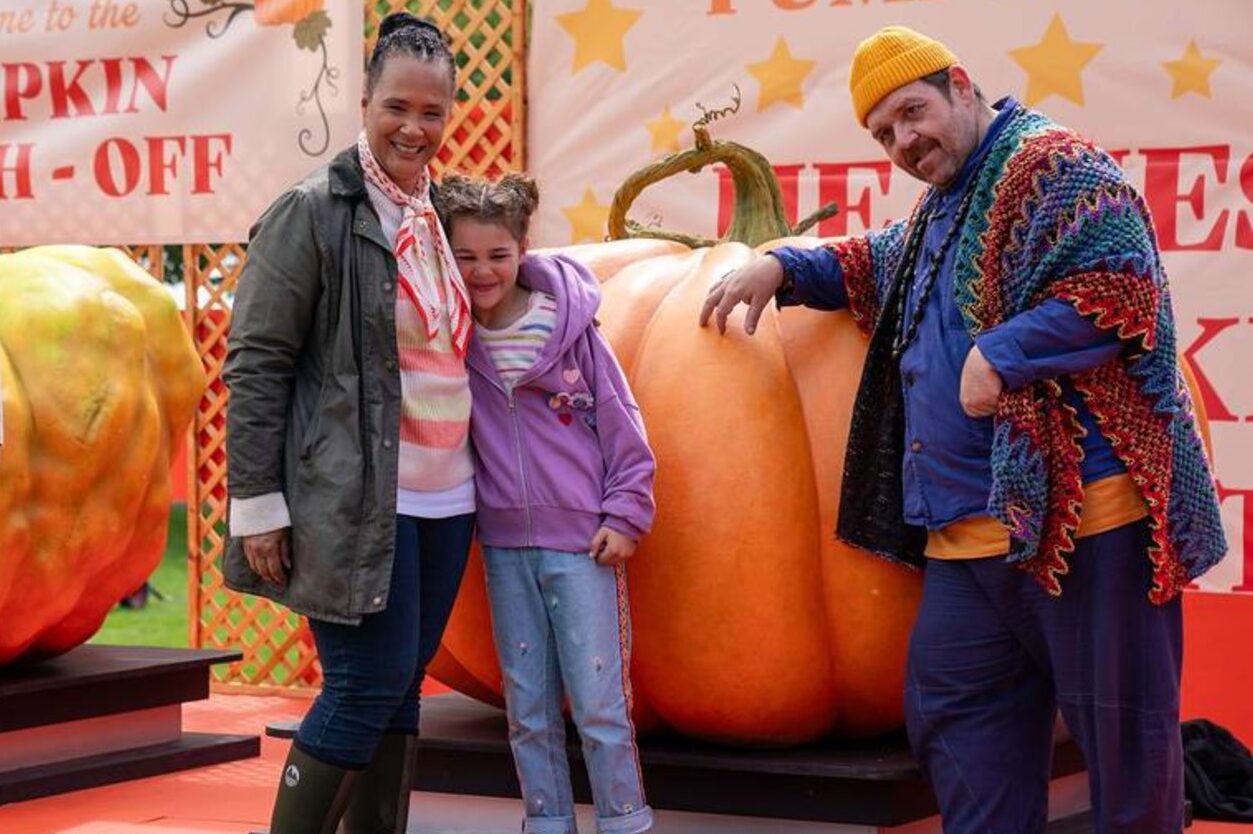A Harvest of Heart

Grow Plants Seeds of Joy in Fertile Ground
Writer Joseph J. Airdo // Phoenix Film Critics Society
In a world where family films often feel manufactured in Hollywood’s content mills, “Grow” sprouts from genuinely fertile soil. This delightful autumn offering doesn’t just capture the season’s spirit — it bottles the essence of what makes fall magical, serving up a story that feels destined to become an annual tradition for families seeking something warmer than pumpkin spice and more nourishing than candy corn.
Set in the self-proclaimed “pumpkin capital of the world,” “Grow” follows Dinah Little (Golda Rosheuvel), a no-nonsense farmer whose tough exterior masks deeper vulnerabilities. When her estranged sister abandons young Charlie (Priya-Rose Brookwell), Dinah reluctantly takes in her spirited niece, unsure how to nurture anything beyond her prize pumpkins. What blooms is an unexpectedly touching story about found family, fierce competition and the magic that happens when we finally put down roots.
The film’s greatest strength lies in its refusal to rush the relationship between aunt and niece. Their bond doesn’t blossom overnight — it grows organically, with setbacks and small victories that feel authentically earned. Rosheuvel, known to many for her regal presence in “Bridgerton,” completely transforms into Dinah, a woman hardened by loss but not beyond redemption. Her initial prickly demeanor gradually gives way to genuine warmth, and Rosheuvel navigates this character arc with remarkable subtlety.
Young Brookwell matches her scene for scene, bringing Charlie’s restless energy to life without ever becoming insufferable. The actress demonstrates remarkable maturity in depicting a child processing abandonment while discovering her unique gift for communicating with plants. These magical moments are handled with just the right touch — whimsical without being cartoonish, meaningful without being heavy-handed.
The supporting cast adds considerable flavor to this autumn stew. Nick Frost brings his trademark blend of goofiness and genuine heart to his role, while veterans such as Jane Horrocks and Tim McInnerny populate the town with eccentric characters who feel lived-in rather than written-in. The film’s secret weapon may be its commitment to treating even the most outlandish pumpkin growers with respect — their passion is real, even if their methods sometimes border on the absurd.
Director John McPhail demonstrates impressive restraint in balancing the film’s magical elements with its grounded emotional core. The pumpkin-growing competition could have easily veered into pure fantasy, but the film maintains its connection to reality even as Charlie’s supernatural green thumb propels the plot forward. The competition sequences themselves are genuinely thrilling — who knew giant gourds could generate such suspense?
Cinematographer George Geddes deserves special recognition for capturing autumn’s golden hour magic. Every frame feels drenched in honey-colored light, from the sprawling pumpkin patches to the cozy farmhouse interiors. The visual palette perfectly complements the film’s warm emotional register, making viewers want to bundle up in flannel and head straight to their nearest farm stand.
The film’s themes of belonging and acceptance grow naturally from its premise. Charlie’s plant communication abilities serve as a metaphor for the patience required in any relationship — both plants and people need time, care and the right conditions to thrive. The script, by Nick Guthe and the husband-and-wife team of Christos Gage and Ruth Fletcher Gage, avoids heavy-handed messaging in favor of letting these themes emerge through character actions and genuine emotional moments.
What makes “Grow” particularly refreshing is its commitment to being a true family film without talking down to its younger audience members. The humor works on multiple levels, the stakes feel real despite the whimsical premise, and the emotional beats land with surprising impact. There’s a nostalgic quality here that recalls the best family films of the 1990s — movies that trusted their audiences and weren’t afraid to let quiet moments breathe between the more dramatic sequences.
The pumpkin-growing competition itself provides the film’s most spectacular sequences. The sight of these massive orange orbs is genuinely awe-inspiring, and the film mines both comedy and tension from the lengths people will go to grow the perfect pumpkin. Yet the real competition isn’t about who can cultivate the biggest gourd — it’s about whether Charlie and Dinah can cultivate something even more precious: a genuine family bond.
“Grow” succeeds because it understands that the best family entertainment doesn’t need to shout to be heard. Like Charlie’s quiet conversations with her plants, the film works its magic through patience, authenticity and genuine care for its characters. It’s a movie that trusts its audience to appreciate subtlety while still delivering the emotional payoffs that make great family entertainment memorable.
For Arizona audiences looking for something to bridge the gap between summer blockbusters and holiday spectacles, “Grow” offers the perfect autumn alternative. It’s a film that celebrates community, family and the magic that happens when we open our hearts to unexpected possibilities. In a season often dominated by scares and frights, “Grow” reminds us that sometimes the most powerful magic comes from simply learning to love and be loved in return.
This is the rare family film that plants itself firmly in your heart and refuses to let go — much like the best autumn traditions, you’ll find yourself returning to it year after year.

